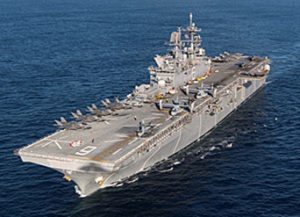Members and Friends:
The mission of the Foundation is to defend and expand the basic rights of Western civilization which we believe are inherent for every individual. These basic rights, including the right to life itself, are an anathema to totalitarian regimes. This has proven again to be the case in 2019, but with one hopeful exception that confirms the values we cherish.
Hong Kong – Yearning to Protect Its Freedoms
Freedom loving people everywhere owe a large debt of gratitude to the brave citizens of Hong Kong who last April began a series of peaceful demonstrations initially demanding freedom from extradition of suspects to be handed over for trial in courts in Mainland China. The new law proposed by the city government under Chief Executive Carrie Lam was in contradiction to the rights set forth in the treaty of 1997 by which the British Colony would become a part of China in fifty years.
Apparently Chinese President Xi Jinping had no intention of waiting that long and began a program to increase its control over Hong Kong’s citizenry. The proposed extradition law was the first of these measures which incited the first peaceful street protests by Chinese students. The protests continued and grew in intensity and were supported of many established citizens. The millions of demonstrators taking to the streets finally had some effect, and Carrie Lam retracted, but not finally withdraw, the hated extradition proposal but did not meet other demands.
Peaceful protests by millions of citizens of a world class city has to be an embarrassment to Xi Jinping, who’s often stated objective is to re-establish the glory days of the Chinese Empire, i.e. “Make China Great Again”.
In many ways China has already achieved that goal, developing the second largest economy in the world over the course of some twenty years. With a population of 1.4 billion vs. the US population of 330 million, this would appear inevitable. The speed of this accomplishment is largely attributed to the adoption of a modified western capitalism, development or theft of intellectual property and a very hard-working people under an autocratic government.
As described by Yan Xuetong,[1] this “vision of a world order draws upon ancient Chinese philosophical traditions and theories…called Wangdau, or humane authority. The word represents a view of China as a benevolent hegemon whose power and legitimacy derive from its ability to fill other countries’ security and economic needs in exchange for their acquiescence to Chinese leadership.” We have heard the term “New World Order” before and it has an ominous intent.
This Oriental philosophy is reflected by the actions of the Chinese Communist Party since it took power in 1921 and confirmed in 1949 when it sent massive military support to the North Korean government which ended in dividing the country. The Chinese government has been an adversary ever since and often has pursued expansion through brutal means (e.g. the Tibet and Xinjaing Autonomous Regions).
However, Wangdau is certainly not the philosophy of all Indo-Pacific countries. Japan, South Korea, Taiwan, Hong Kong and Singapore all have largely Oriental populations that have become vibrant democracies. The other major Indo-Pacific countries, India, Singapore, Australia and New Zealand were all formerly part of the British Empire and Malaysia, the Philippines and the Southeast Asia group were at one time European or American colonies. Each of these countries, to a greater or lesser extent, have adopted Western style governments and legal systems. These are part of the core values cherished by the “liberal-Atlanticist” foreign policy proponents. English is the second language of most of these countries and the common language for business.
The situation in Hong Kong is not yet resolved and the government of Xi Jinping has a made closer integration of Hong Kong and unity with Taiwan a key part of his Chinese dream. His dream is not shared by those who would lose their freedoms as a part of the high-tech police state that is now being created in Mainland China.
The western world, while welcoming China’s acknowledged contributions towards achieving higher standards of living for millions of people, should continue to support all those who seek freedom from autocratic rule. Perhaps the Norwegians should consider awarding the Nobel Peace Prize to the citizens of Hong Kong.
The Foundation for International Freedom supports these efforts.


